YearPhoto
Newton Year in Review 2023. Photos by Newton Beacon
It’s been quite a year.
Inflation has gone down but still persists. A former president was indicted four times on 91 offenses. And Taylor Swift started dating a guy with Super Bowl rings.
Newton has had quite a year, too. The mayor asked for a tax levy override. Teachers demanded a better contract. The schools got their first woman superintendent. A massive zoning overhaul effort was debated and passed. Multiple incumbents lost their seats in an election centered around that zoning overhaul.
Here are the seven biggest stories of 2023 in Newton:
1. The override
The year started with a big request. Mayor Ruthanne Fuller asked voters to approve an override to the state’s Proposition 2 1/2 law—which says a local government can’t levy a tax on the community at greater than a 2.5 percent increase from the year before, excluding new growth, unless voters pass a measure to override it—so the city could fix up two schools and add funds to its general budget for roads and other needs.
It was actually a request for three separate override measures.
One was for $2.3 million a year for 30 years to be spent to renovate the Countryside School. The second request was for $3.5 million a year for 30 years to renovate the Franklin School.
And lastly, the third was a request to add $9.2 million to the general budget, which would remain in the budget permanently.
Groups geared up for and against the override, and the mayor went all in with her pitch for it. Newton business owners said raising taxes during an inflation crisis would hurt them. But advocates said the override would help the city reach its climate change goals.
The override campaign, which started in January and ended with a March vote, was a stark reminder of the importance of independent, nonpartisan local news.
And thus, the Newton Beacon was born. A group of civic-minded Newtonians formed a board and wrote articles explaining what the override campaign was all about. Then in June, the board hired an editor and lead journalist, Bryan McGonigle, to get the Beacon producing solid local news for Newton every day.
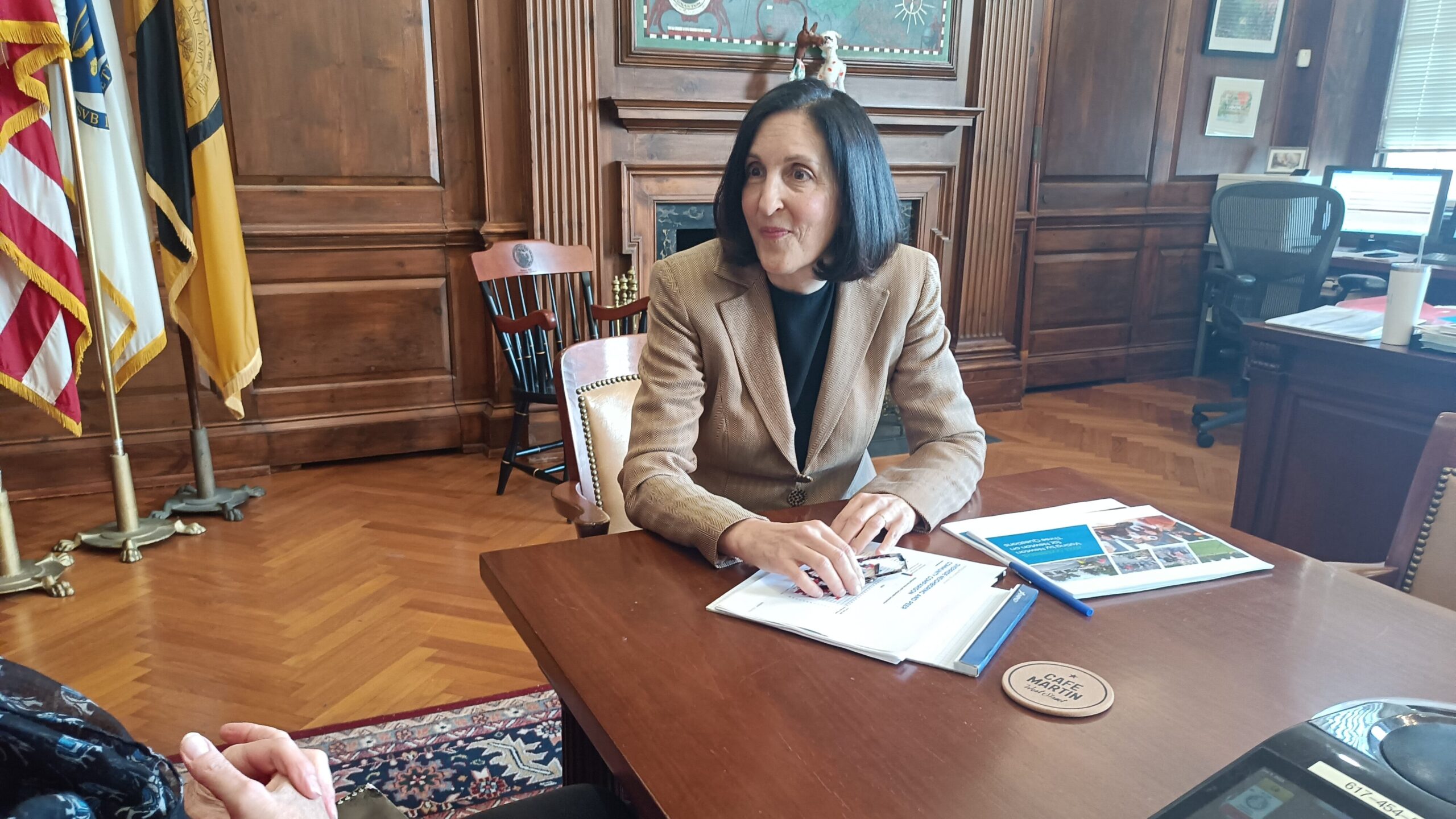
2. The school contract battle
Newton teachers spent much of 2023 fighting for higher cost-of-living pay increases, better employee benefits and more. The School Committee and Mayor Ruthanne Fuller have pushed back, insisting that the city can’t afford the Newton Teachers Association’s requests.
That battle heated up with the summer air, when the School Committee requested state mediation in July. Shortly after, the NTA went into “work to rule” mode, which means teachers report to school, teach their students, grade homework and tests—everything that involves teaching—and do not participate in district initiatives or other non-teaching work.
In late August, the NTA organized a boycott of the first day convocation ceremony, for which attendance was traditionally optional. In response, the School Committee filed a complaint with the state accusing the NTA of carrying out a strike action. It’s illegal for teachers to strike in Massachusetts.
In September, the Commonwealth Employment Relations Board ruled that the boycott was a strike.
Throughout the fall, teachers held rallies outside of School Committee meetings and organized email campaigns. Superintendent Anna Nolin has cited progress made in negotiations, and so has the School Committee. But the NTA maintains that real progress to be made has been held captive by Mayor Fuller.
As teachers worked their 100th day without a contract, the NTA capped off the holiday season with a press conference announcing a “no confidence” vote in Mayor Fuller and the School Committee.
As the schools closed for winter vacation, the School Committee announced an increase to cost-of-living pay raises and the NTA said it wasn’t enough and claimed the increase was offered as a package with other things they didn’t want, and the teacher contract battle will continue into 2024,
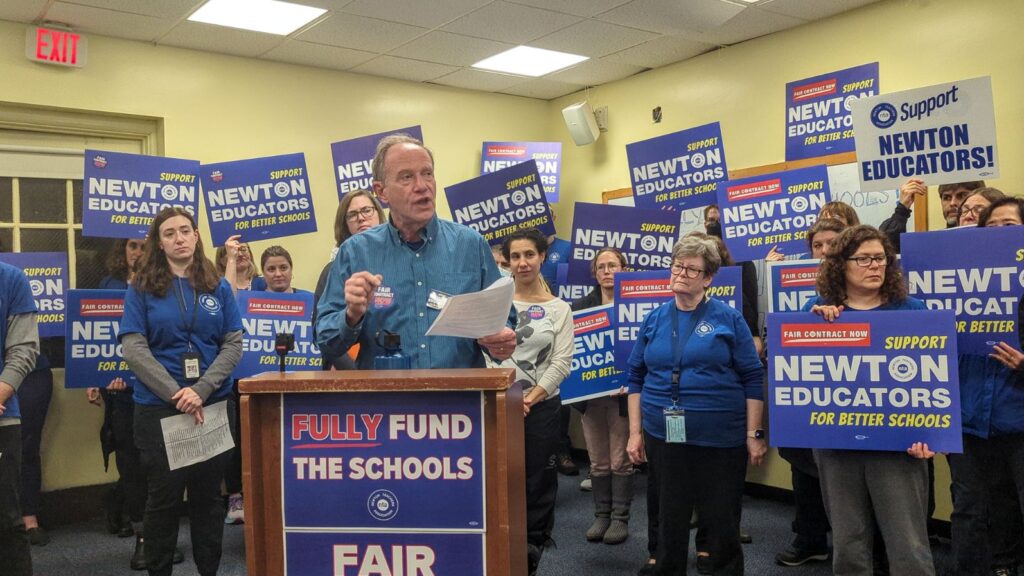
3. The Murders
Newton is consistently ranked one of the safest cities in America.
But this summer, two violent crimes shook the Garden City to its core.
On June 26, the bodies of three people—Bruno D’Amore, his wife, Jill D’Amore, and her mother, Lucia Arpino—were discovered by a neighbor on Broadway Street.
The suspect in the triple homicide, Christopher Ferguson, 41, was charged shortly after. Prosecutors say Ferguson stabbed all three victims and hit one in the head with a blunt object more than 30 times.
On July 15, police received a call from a boy who said his father was beating his mother with a baseball bat. When police arrived, they found Nancy Hanson, who later died from her injuries. Police arrested her husband, Richard Hanson, for her murder.
The murder happened just a few days after a court granted Nancy Hanson a restraining order against her husband.
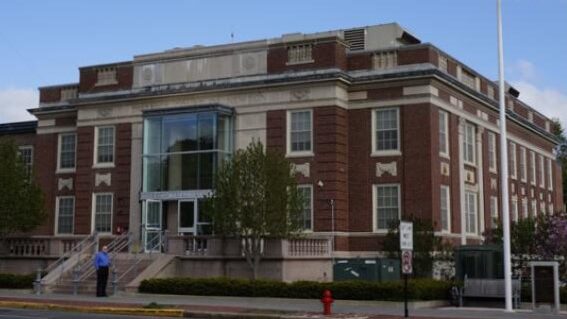
4. The Bicycle safety push
In August, a well-respected Tufts professor was killed when he was hit by a UPS truck while riding his bicycle on Watertown Street. His death brought attention to a rising concern in Newton: bicycle safety.
As the city has grown in population and its streets have become more and more crowded, bicyclists have said they don’t feel safe riding in many parts of the city.
Newton is working on a city-wide bike/pedestrian network plan aimed at addressing major hazards for people walking or riding bikes, as City Hall is trying to promote non-vehicle travel among the 13 villages.
And Joshua Ostroff in the city’s Planning Department said the city would be looking at bicycle lanes and other safety enhancements for future road construction projects.
Meanwhile, Newton’s Safe Routes to School program has been hard at work promoting bike and walking safety for the city’s kids.
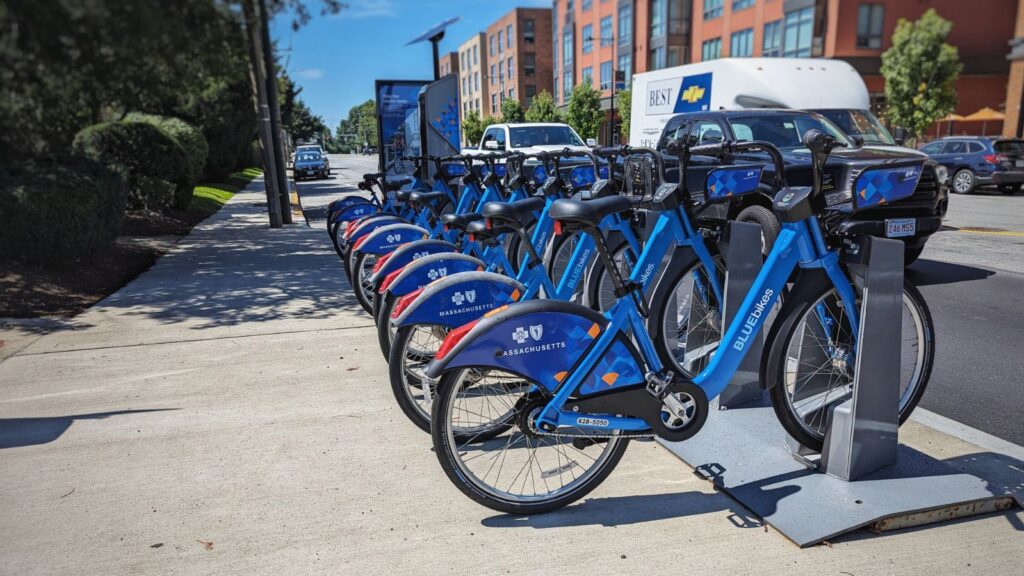
5. The rain
Anyone who thought the relatively low amount of snow New England saw last winter was a sign of smooth sailing was painfully mistaken.
The weather-and-climate story of 2023 was rain. So much rain.
Scientists have told us for a while now that climate change would bring us hotter temperatures, more severe storms and more rain. They weren’t wrong.
In 2023, Massachusetts had one of its wettest summers on record, with around 20 inches of rain falling (twice the typical Massachusetts summer rainfall amount).
And it wasn’t just rain. It was lots of rain in short time periods that caused flooding all over Newton. In early August, a heavy rain storm flooded homes and businesses across the city and even flooded the Newton Free Library parking lot.
The rain didn’t let up with the cooling temperatures. Massachusetts saw above-average rainfall in the fall and a December storm that flooded many roads in Newton and brought down countless tree branches in the process.
The city is extending its yard waste pickup period and officials are working on measures to mitigate some flooding, including dredging the City Hall ponds. And infrastructure and development projects in the future will have to take flooding into consideration with planning and construction.
Such measures would be needed even without this year’s floods, officials have said, because Newton is surrounded by the Charles River so its water table is already high.
6. The Village Center Overlay District
There was a time when zoning and zoning boards were about as attention-grabbing as beige paint. Then came the MBTA Communities Act and Newton’s Village Center Overlay District proposal.
In 2021, the state legislature passed the MBTA Communities Act, which mandates cities and towns with MBTA stops to up-zone for higher residential density within half a mile of those MBTA stops. Around the same time, Newton officials were examining how to add more life to the city’s village centers by promoting more housing in them.
And thus, the Village Center Overlay District proposal was born, with the goal of promoting public transportation, bringing more customers to village center businesses and fighting climate change.
As discussions and meetings went on, and as an election season approached, the Village Center Overlay District became a battleground.
After an election that cost three VCOD-supporting city councilors their seats, the mayor publicly suggested a compromise and on Dec. 4, the City Council started amending the VCOD plan by carving parcels out of it and moving lots to lower-density zones within the VCOD. Border Street was added back in after debate over an old misplaced pipe that cuts off a culvert and causes occasional flooding. Then several villages were removed from the VCOD entirely.
On Dec. 4, the City Council passed a scaled-down version of the VCOD plan, and now the city awaits a feasibility analysis from the Metropolitan Area Planning Council to give to the state along with the newly passed zoning ordinance.
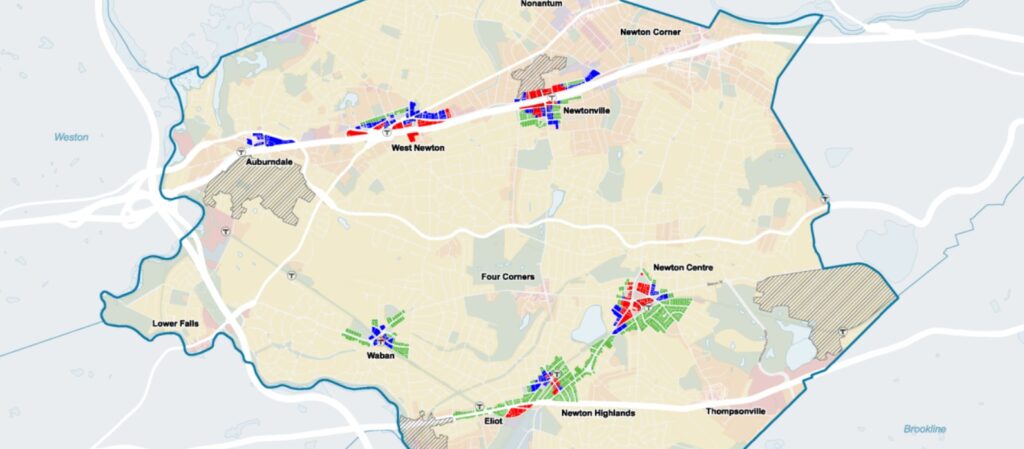
7. The Election
That zoning debate engulfed the whole election season.
Advocates running for City Council, including most incumbents in competitive races, hailed the VCOD as a way of revitalizing the village centers in a way that creates more housing near public transportation. Opponents said allowing higher density development would cause developers to erect colossal buildings with thousands of apartments to overcrowd the village centers.
City council candidates talked about roads, schools, climate change policy and more. But at debates, forums and campaign events, voters wanted to talk about zoning.
Groups like Newton for Everyone began endorsing the zoning plan and candidates who supported it. Groups like Right Size Newtron and Save Newton Villages geared up in opposition to the zoning plan and endorsed candidates who opposed it.
At one point, people opposed to the zoning plan created a political action committee and named it after a group that supported the rezoning plan, creating election season confusion.
When November’s election came around, voters ousted three incumbents who had supported the Village Center Overlay District plan—Deb Crossley from Ward 5 (at-large), Alicia Bowman from Ward 6 (at-large) and Holly Ryan from Ward 8—and elected several new members who had run in opposition to the plan.
When the City Council convenes in January, it will have new faces—David Micley from Ward 2, Randy Block from Ward 4, Rena Getz from Ward 5 (at-large), Martha Bixby from Ward 6, Alan Lobovits from Ward 6 (at-large), and Stephen Farrell from Ward 8—and City Councilor Marc Laredo as its president.
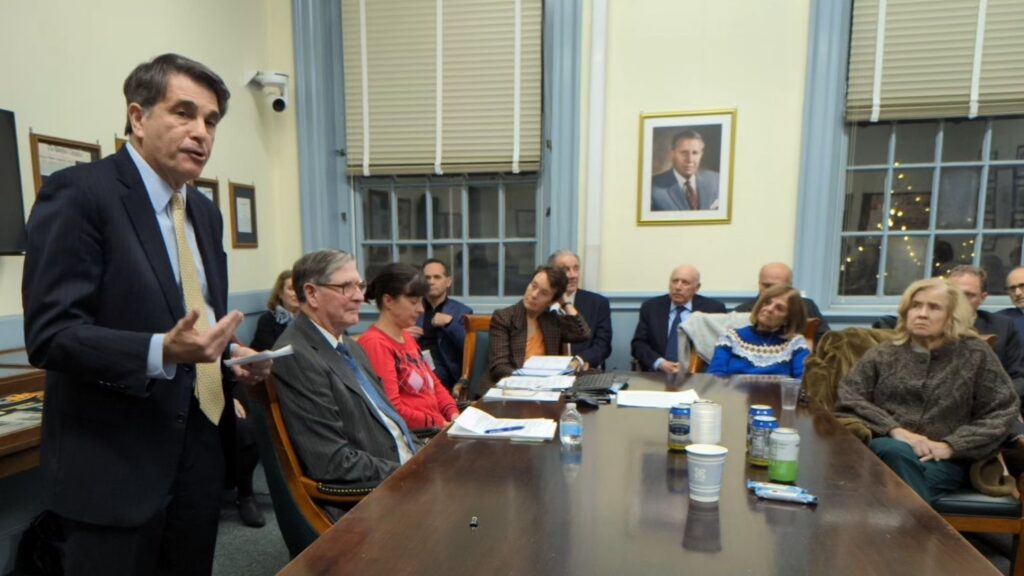
Laredo won the presidency after several tie votes when Councilor David Kalis broke the stalemate and backed Laredo. Kalis will be the Council’s vice president.
And in a last-minute post-election shake-up, Councilor-elect Martha Bixby faced a recount after her opponent, Lisa Gordon, claimed there were irregularities in vote counts. The recount affirmed the election results, however, and Bixby kept her election victory.
The new City Council is set to be sworn in on Monday.
See you in the new year, Newton.